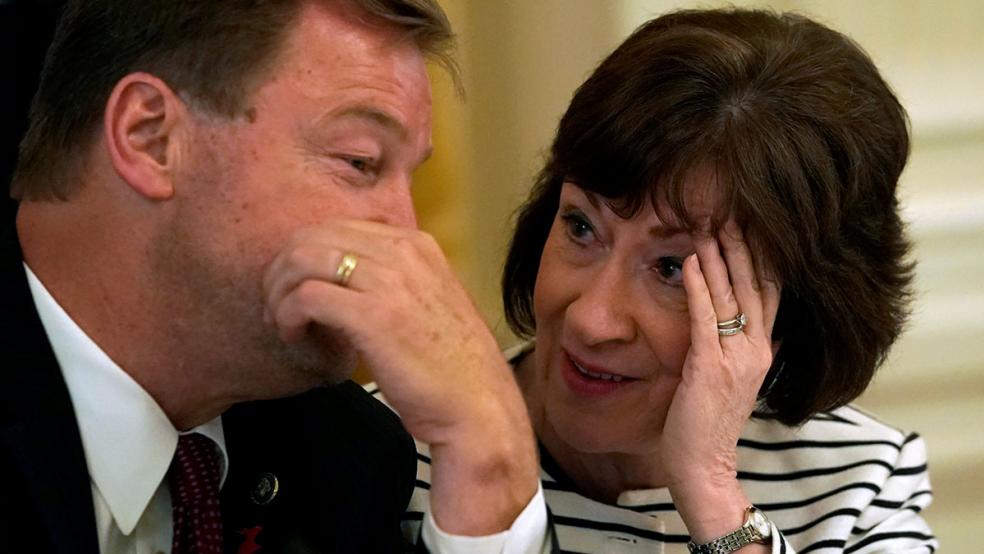A group of Republican senators, including one who has until now not been a major voice in the debate over the chamber’s efforts to repeal and replace the Affordable Care Act, are proposing what amounts to heresy within the broader GOP: retaining tax increases on the wealthy that the ACA put in place, fund more access for the poor.
The idea they are floating is to continue with the plan to abolish the various taxes imposed when the ACA was put in place, except for one: a 3.8 percent surcharge on investment income that targets individuals with income over $200,000 and families with income over $250,000. Doing so would preserve revenues worth about $172 billion over the next ten years, creating room in the bill to scale back proposed reductions in federal Medicaid spending and perhaps to help reduce out-of-pocket health care spending for low-income Americans.
Related: Rand Paul’s Health Care Wish List Could Be a Deal Breaker for the GOP
Maine Sen. Susan Collins has been one of the most visible opponents of the bill that Senate Majority Leader Mitch McConnell was forced to pull back from an expected floor vote this week. She has criticized it for its treatment of Planned Parenthood as well as cuts that she says would reduce access to care for her disproportionately old and low-income constituency.
In an interview Wednesday, she told Bloomberg News that she couldn’t justify eliminating that tax because it doesn’t drive up the cost of health care. “So I distinguish between those tax increases that were part of Obamacare that increase premiums and the cost of health care versus those that do not.”
On Thursday morning, South Dakota Sen. Mike Rounds, who took office in 2015, expressed a similar view in an interview with National Public Radio.
“There are a number of taxes that are being repealed, appropriately so because they impact everybody and they’re driving up the cost of healthcare,” he said. “But there is one particular tax that was imposed by Obamacare that was on the incomes of individuals and families who earn more than $250,000 per year. If that particular one was not repealed, it would allow us about $172 billion of additional revenue coming in over this 10-year-period of time that could be used to make some improvements in the benefits under the bill.”
Related: Why State Governors Are Freaking Out About the GOP Health Plan
Asked if he was speaking for a large number of senators, Rounds demurred, saying the legislators could speak for themselves individually. But he held out at least the possibility that the issue is on the table.
“I can tell you that both privately and as a general group, we have talked about this issue,” he said. “There is no consensus yet -- it wouldn’t be fair to call it that, but that’s why we wanted more time.”
Collins and Rounds aren’t alone in signaling that the relentless criticism of the distributional effects of both the Senate plan and a related bill passed by the House of Representatives last month, both of which enormously benefit the very wealthiest Americans while reducing benefits for low-income and the middle class, is affecting GOP lawmakers’ thinking.
Tennessee Sen. Bob Corker on Wednesday also spoke favorably about retaining the 3.8 percent tax on investment income.
Related: Here Are Five Reasons Why the GOP’s Health Bill is Doomed
He said he was uncomfortable with the Senate bill because it took a step “backward” in terms of making health care affordable for low-income Americans. “It's something that's important to me that lower-income citizens have the ability to actually purchase plans that give them healthcare or insure them, and I know there are other members that have expressed the same,” he told reporters following a meeting with McConnell.
“At the same time, the 3.8 percent tax on the wealthy was being done away with. That's not an equilibrium that to me is appropriate,” he said. “That's not a trade-off that's appropriate. That's not an equation that is appropriate.”
Even Republicans who have been opposed to the bill from the right, arguing that it is not conservative enough, are starting to get uncomfortable with the optics of a massive tax deduction for wealthy families that translates into little benefit for everyone else.
Utah Sen. Mike Lee complained this week that the Senate bill “included hundreds of billions of dollars in tax cuts for the affluent, bailouts for insurance companies and subsidies for lower-income Americans.”
Related: Senate Health Bill Would Drive Coverage Down by 22 Million: CBO
It’s important to note that even if there is significant support for keeping the 3.8 percent investment income tax, adding that change is no guarantee that the bill will pass. There is considerable opposition to the bill on the far right of the GOP, where elimination of ACA-related tax cuts is practically a sacred obligation. Adding back $172 billion in tax revenue could easily push just as many Republican votes away from the bill as it adds.
Because Senate Democrats are united in opposition to the bill, Republicans’ slim majority gives them little room for error, even though the bill is expected to be passed in an expedited budget reconciliation process that protects it from the filibuster.
If McConnell loses more than two of his 52 votes, the bill cannot pass, and right now the math doesn’t look good.





